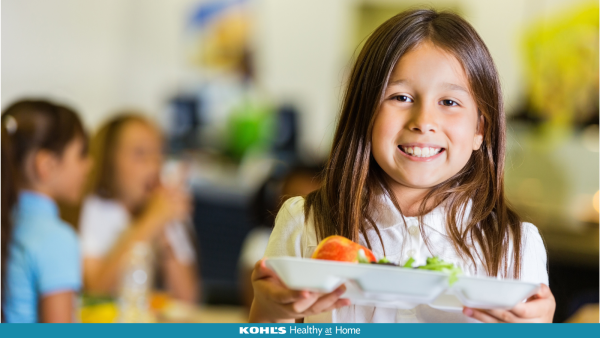September 30, 2022
The Importance of School Meals
With back-to-school season underway, families and educators are preparing to support student health and academic success.
English | español
One critical element is ensuring students have access to healthy food. Research shows a balanced diet fuels students’ minds and bodies to ensure they show up to school ready to learn. For many of America’s youth, school is the primary source of consistent, balanced nutrition.
The 2021 Feeding America childhood hunger data estimates that 1 in 6 children live in food-insecure households. The U.S. Department of Agriculture (USDA) strives to fill the hunger gap by providing low-cost or free school meals through the School Breakfast Program (SBP) and the National School Lunch Program (NSLP). Any student may participate in school meal programs. These programs provide a healthful balance of fruits, vegetables, whole grains, low-fat milk, and protein foods, which improves not only nutrition security, but also social-emotional health, academic performance, and attendance.
Ways to Promote School Meals
Spread the Word
Caregivers, parents, and educators can advocate for school meals by sharing about these programs with their school community. Ask the school nutrition director if your school celebrates National School Breakfast Week, National School Lunch Week and share these quick videos about the benefits of School Breakfast and the benefits of School Lunch in English and Spanish.
Watch and share the videos here:
- What Is School Breakfast?
- ¿Qué es el desayuno escolar?
- What Is School Lunch?
- ¿Qué es el almuerzo escolar?
Involve Students
Student involvement is key when spreading the word about the importance of school meals. Involve students by asking them to share ideas they have for the school menu. Share their feedback with the school nutrition team and loop back with the students about how their voice was used to make meaningful changes in the cafeteria.
Be a Positive Role Model
Teachers are important influencers and play a key role in modeling healthy behaviors for students. Educators can model healthy eating by purchasing a school meal. Parents and caregivers can also help shape children’s eating habits by role modeling healthy cooking and eating at home. Healthier Generation and Kohl’s Healthy at Home have teamed up to provide these great Tips for Cooking with Kids and Teens. Preparing and eating meals together helps children learn important communication, social, and emotional skills.
Discover more family-friendly resources that support whole child health at KohlsHealthyAtHome.org and Kohl's Healthy at Home en español.


